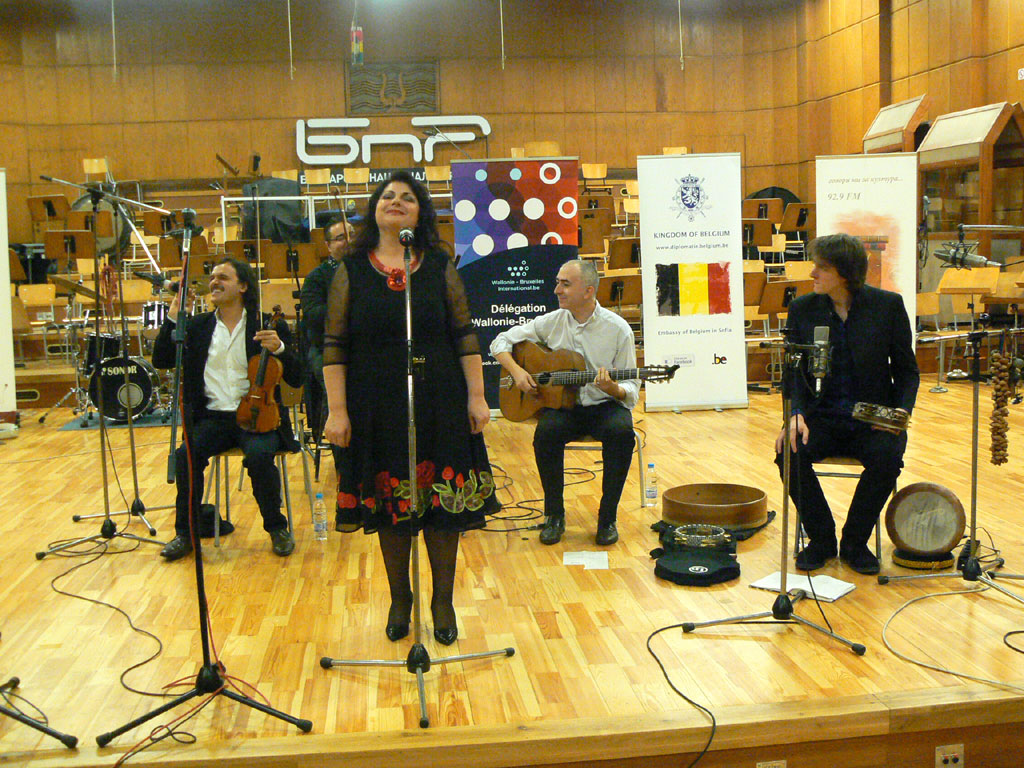The famous folk singer Stoimenka Nedyalkova celebrates her 50th anniversary on June 9. An outstanding performer of the authentic singing style from the Pazardzhik region, with her beautiful expressive voice she has repeatedly aroused the exaltation of the audience in Bulgaria and around the world.
At the beginning of this year, Stoimenka was awarded the Sladkopoina Chuchuliga /Sweet Singing Lark/ Award by the association ˮFor Music and Dance in the Pazardzhik Regionˮ, headed by Atanas Cholakov. The award is a recognition of her dedication to the Pazardzhik song and tradition. She was born into a family of prominent singers and instrumentalists. Already in her school years Tima's performances, as everyone calls her, including in duet with her sister, were awarded gold medals at the national festivals in Koprivshtitsa.
Her gift and her love for Bulgarian folklore led her to the National School of Folklore Art in the village of Shiroka Laka. Later she also successfully completed her higher education at the Academy of Music, Dance and Fine Arts "Prof. Asen Diamandiev" in Plovdiv with majors in conducting and performance.
The famous folk singer shares memories of her childhood and professional career with Radio Bulgaria:
"I grew up in a family where folklore was held in high esteem. My grandmother Stoimena sang beautifully. When she was sad, she sang her sorrow out in song. I used to hide and secretly listen to her, spellbound. My mother Rositsa Uchikova was one of the outstanding singers of Pazardzhik. She passed on her passion for folk music to her children - to me and my sister.
My paternal grandfather was a very good clarinettist. He was from the village of Churekovo, Devinsko, in the Rhodope Mountains. We used to spend summers there, running on the meadows and footpaths. I remember how my grandfather used to dress up and go to the Plovdiv region to play at weddings."
Tima is vocalist in Glo Bal Kan project, which performs Bulgarian, Balkan and world folk. The formation was created on the initiative of her husband Nedyalko Nedyalkov. One of the compositions is dedicated to Tima Nedyalkova and is called "Tima's 11", referring to the 7/8 beat in Bulgarian folklore.

She has also participated in projects of Aka Balkan Moon:
From 1995 to 2013 she sang in the women's folk choir Bulgarian Voices - The Angels. She remembers the excitement of foreign audiences during the choir's tours. The choir has even shared the stage with Bobby McFerrin.
ˮWith Bobby McFerrin we did two concerts in Europe and one in Sofia, in the National Palace of Culture. The feeling of singing with such a famous musician is indescribable. The symbiosis of our music with his jazz improvisations is unique. And another memorable moment - in 1997 in Los Angeles we saw Stevie Wonder in the front row. He was very impressed with our voices. In the concert we sang together with the Huun-Huur-Tu ensemble from Tuva and the Moscow Art Trio. After the concert Stevie Wonder expressed his delight, we took pictures, talked.
In 2012 I was invited by the world famous baroque musician and conductor Jordi Savall to participate in the project Bal-Kan - The Cycles of Life, together with Nedyalko Nedyalkov - kaval, Valery Dimchev - tambura, Peyo Peev - bagpipe, Stoyan Yankulov - percussion and musicians from the Balkans, Belgium, Spain. It was an honour to be with such famous musicians and I am proud to present our folk singing."
Tima Nedyalkova is also one of the best teachers of folk singing.
ˮI am currently teaching 22 students. 17 classes have passed through my hands. I am the first teacher of folk singing in 144 Sofia High School of Arts. Many of my students continued their education in higher institutes. Children come with a hunger for knowledge and new songs, and my mission is to help research and disseminate Bulgarian song folklore. They will pass on that love to their children, their students, so that our folk song will live on in eternity. I wish our compatriots to be proud of our Bulgarian folklore heritage and to pass it on with dignity to our children and grandchildren so that it remains for generations. Because our musical tradition is what distinguishes us from all nations in Europe and the world."
Editor: Albena Bezovska
Photos: BNRMoving to Bessarabia more than two centuries ago, some Bulgarians brought with them part of their rich rituals. In their new homeland, some customs became modified under the influence of local traditions, others disappeared, and still others have been..
The first day of January is a day filled with emotions and joyful anticipation of a prosperous year in which all family members will be healthy and will make all their dreams come true. In the traditional Bulgarian calendar, 1 January is known as..
On the first day of the incoming 2025, the small town of Razlog in the Pirin Mountain will wake up to the sound of bells, zurnas and drums . Traditionally, the colorful Kukeri festival "Starchevata" will begin at 11:00 a.m. on the central square..

+359 2 9336 661
